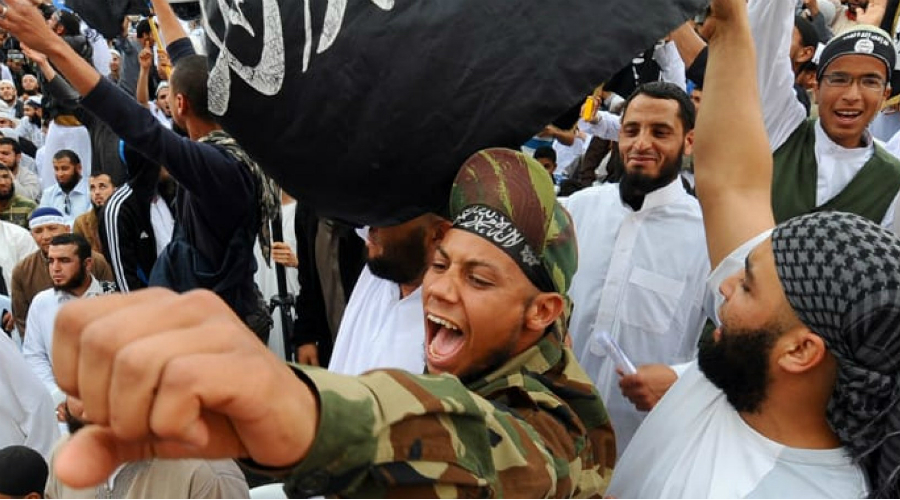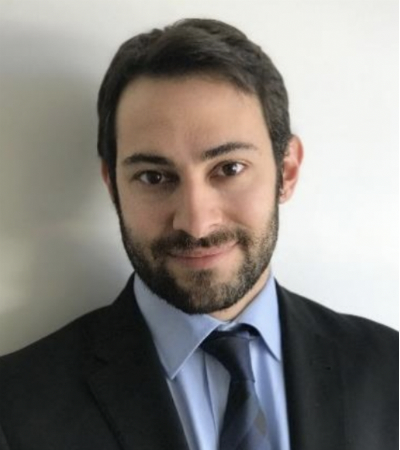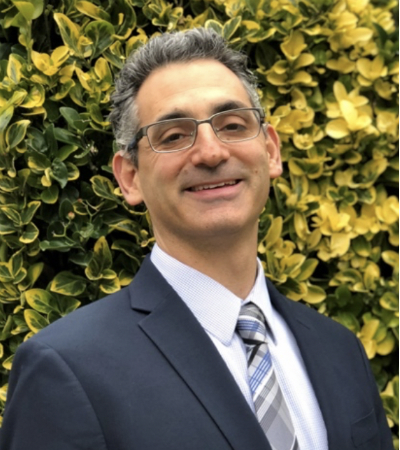How States Foster Violent Extremism and What the United States Should Do About It
Over the past two decades, extremists have successfully exploited both intrastate politics and interstate relations to further their own state-building projects. In particular, they have targeted marginalized, peripheral regions of fragile states, where citizens are politically and economically excluded by their governments. Stopping the spread of extremism will require a broader strategy to address the often counterproductive role played by government actors, instead of focusing narrowly on potentially radicalizing individuals.

Published by The Lawfare Institute
in Cooperation With

Over the past two decades, extremists have successfully exploited both intrastate politics and interstate relations to further their own state-building projects. In particular, they have targeted marginalized, peripheral regions of fragile states, where citizens are politically and economically excluded by their governments. Stopping the spread of extremism will require a broader strategy to address the often counterproductive role played by government actors, instead of focusing narrowly on potentially radicalizing individuals.
Why Addressing Only Individual-Level Recruitment Won’t Work
Policymakers have focused mostly on addressing the individual-level causes of extremism, hoping to dissuade individuals from joining or supporting violent groups. This focus on individual-level motivations has produced some qualified successes, notably the INVEST program in Afghanistan and the Somali Youth Learner’s Initiative (SYLI). These programs, however, are no panacea. We don’t know whether their effects remain for longer than one year, or if they would persist in the face of political or economic shocks. And even the most successful programming will not dissuade every participant from supporting extremism or reach those who refuse to participate.
Moreover, in cases where support from local partners is not forthcoming or national governments are reluctant to embrace a U.S.-funded initiative, progress will be much more limited. The SYLI, for example, was implemented in close coordination with and approval from Somalia’s regional and central education ministries, which received much of the credit for the program’s success. By contrast, in Northeastern Nigeria, up to half of the food aid intended for Boko Haram victims has been stolen by officials and millions of children remain out of school. Without support from state and local actors, outsiders trying to manage outcomes through the provision of aid alone are likely to achieve little.
How State Actors Matter: The Politics of the Periphery
Most policymakers, analysts and practitioners understand that extremism is concentrated in fragile states, or states where a combination of weak or predatory governance enables territory-seeking insurgencies to emerge. What is less understood is that extremist militancy is typically restricted to certain subnational regions. In Nigeria, for example, nearly three-quarters of all deaths related to the Boko Haram insurgency have occurred in Borno State, a region home to just 3 percent of the country’s population. From the Afghanistan/Pakistan border region to the Sinai Peninsula, extremist groups tend to draw support from and conduct operations in geographically limited areas.
Across the Middle East and Africa, governance in marginalized subregions is strikingly similar. Most of these regions are populated by groups that have been historically excluded from state power and have histories of popular revolt. To establish control, virtually every national government has adopted systems of patronage and repression centered around the co-optation of traditional elites—a hallmark of governance throughout the Middle East and Africa. In Libya, for example, Muammar Qaddafi used the country’s oil wealth to establish a “distributive state” that apportioned resources through tribal and clan-based patronage networks while crushing all dissent through a pervasive security state.
Authoritarian rule through patronage and repression can create political opportunities for extremists by generating popular resentment and causing local elites to abandon their state patrons, leaving a power vacuum. This disruption and disorder may take years to come to the surface. When Qaddafi seized power in 1969, Libya’s Cyrenaica region, a bastion of resistance against colonial rule and support for the former regime, became politically and economically marginalized. During the violent protests against Qaddafi’s regime in 2011, some Cyrenaican elites fled the country and others joined the revolt. Jihadists, who had established a presence in Cyrenaica in the early 1990s, were able to capitalize on this chaos and establish themselves as the dominant force in the region for a time. From Mali to Iraq to Somalia, extremists have gained support by positioning themselves as defenders of marginalized groups, tribes or clans.
Despite these risks, mixing patronage and repression to govern is enticing to regimes seeking to control restive regions because it requires minimal effort or investment. It does not require the sorts of concessions necessary to build popular legitimacy, nor does it require spending on service provision. It does, however, create a pattern of state-society relations that extremists exploit and international actors often enable.
How International Actors Matter: The Role of the International Community
The great tragedy is that when outside actors meddle in the affairs of fragile states, they often make things worse. Foreign aid or military assistance can strengthen the ability of governments in fragile states to rule the periphery through patronage and repression—reinforcing the fissures exploited by extremists. Large amounts of aid that donors provided to Mali prior to its 2012 collapse appear, for example, to have exacerbated regional inequalities and helped fuel support for an al-Qaeda-backed rebellion. Versions of this story have played out elsewhere, whether it be Iranian and Russian patronage of the Assad regime before the Arab Spring or U.S. military support to Egypt.
Outside actors can play an even more destructive role when fragile states collapse and international actors seek to gain or retain influence by directly backing nonstate armed factions. Pakistan, for example, offers support for the Taliban in part because it prefers a weak, divided Afghanistan to a strong one that might ally with India and be subservient to the United States. Similar regional patron-subnational client relationships exist between Iran and Hezbollah in Lebanon, the Persian Gulf States and political groups in Somalia, and Qatar and various Islamist militias in Libya. Syria, where the Persian Gulf States, Iran, Russia, Turkey and the United States have supported a complicated array of state and nonstate actors, is a telling example of how such rivalries can empower extremists. Because of the Assad regime’s weakness, even its allies have sought to bolster their influence by building up proxy militias, but this strategy decentralizes control and delegates power to destabilizing groups.
What the United States Can Do
Effective policy requires moving past the characterization of extremism as an individually centered phenomenon with no clear cause. “Countering violent extremism” efforts go only so far if local patronage politics, oppressive central governance and an increasingly unsettled world order continue to swell the ranks of the marginalized. Four aspects of U.S. and international policies will have to undergo significant changes in order to arrest the spread of violent extremism.
First, diplomatic and development resources meant to prevent extremism need to be less focused on building up the core at the expense of the periphery. The central issue driving the spread of extremism is problematic state-society relations in particular regions of fragile states—not the lack of state capacity. In fact, providing resources to central government actors may at times worsen extremism by enabling the core to control the periphery through repression and the selective allocation of these resources. Efforts to promote equitable service delivery and include historically marginalized groups in political and economic decision-making will go a long way toward building up resilience in communities targeted by extremists. Regional governments, local governments, traditional leaders, civil society, youth and women have a critical role to play here and are too often thought of as secondary to the needs of the central government’s leadership.
Second, the United States and its partners must pursue a more coherent, coordinated approach. In many places in Africa and the Middle East, the United States is no longer the dominant, and certainly not the only, major international power with significant interests at stake. More than ever, the United States needs to ensure that its resources are spent in alignment with other donors in Europe and elsewhere. Bureaucratic reforms, such as more targeted, flexible funding and increased capacity to do diplomatic and development work in conflict-affected areas, are needed as well.
Third, the most important area for national-level engagement is not with diplomats and economists, but with soldiers, judges and police officers. For too long, the United States has assumed that building up the capacity of central government security forces to commit and manage violence will enable fragile states to manage extremism by themselves. Instead, the United States has learned that attempting to build the capacity of corrupt, factionalized security services often makes extremism worse when security forces commit human rights abuses or poorly maintained equipment falls into disrepair or is stolen by insurgents. The United States and its partners need to prioritize improving security-sector transparency and accountability, strengthening the rule of law, establishing a basic level of communication and trust between civilians and security forces, and enhancing the ability of local communities to police themselves.
Finally, the United States needs to redouble its efforts to help fragile states prevent, resolve and recover from conflict. From the Sunni triangle in Iraq to south-central Somalia, a key element in explaining the resilience of extremist groups is their ability to continue to foment violent resistance to the state even after suffering defeat after defeat on the battlefield. These war-torn states will face serious pressures to negotiate with, demobilize, share power, and even reintegrate Islamic State and Boko Haram militants back into their societies. It is an open and controversial question if any of these efforts provide the best way to curb the growth of extremism over the long term. But one thing is certain: Rather than endlessly pursuing militants, the United States should be prepared to negotiate with such groups if they can meet certain preconditions and even incorporate some of them into a broader political settlement provided they lay down their arms.
These recommendations will not be easy to implement. They will require the United States to adopt a longer term approach, be more realistic about what it can achieve, and take real measures to limit the ways in which its engagement with fragile states has made extremism worse. Yet with patience, humility and resolve, the United States can chart a new way forward in the Middle East and Africa that forestalls the next extremist resurgence and helps partner governments secure a better future for their citizens.







